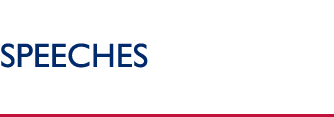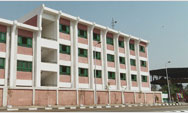 |
|
 |
 |
 |
- 10/21/08: Remarks by Henrietta Fore, Administrator, USAID and Director of U.S. Foreign Assistance at the White House Development Summit
- 10/08/08: Remarks by Henrietta Fore, USAID Administrator and Director of U.S. Foreign Assistance at The President's Freedom Agenda
- 10/01/08: Remarks by Henrietta H. Fore, Administrator, USAID and Director of U.S. Foreign Assistance, at the Ceremony Marking the Full Operational Capacity of Africa Command (AFRICOM)
- 09/25/08: Remarks by Henrietta H. Fore, Administrator, USAID and Director of U.S. Foreign Assistance, at 2008 Millennium Development Goal Malaria Summit, New York - "U.S. Leadership in the Fight Against Malaria"
- 09/22/08: Remarks by Henrietta H. Fore, Administrator, USAID and Director of U.S. Foreign Assistance, at the White House Symposium on Advancing Global Literacy - "U.S. Commitment to Advancing Global Literacy"
 RSS Feed for Recent USAID Speeches and Testimony RSS Feed for Recent USAID Speeches and Testimony
|
|
 |
 |
|
Opening Remarks by Henrietta Fore
Director of U.S. Foreign Assistance and Administrator, USAID
Panel on Effective Strategies for Good Governance
White House Development Summit
October 21, 2008
- AS PREPARED -
Good morning. I am delighted to moderate the panel on the importance of good governance to sustainable development. Stable democratic institutions that are responsive to the needs of the people, along with sound economic policies and rule of law are the basis for sustained economic growth and poverty reduction.
Under the leadership of President Bush, the United States has begun to approach international development from that new perspective. What Secretary Rice has talked about, bears repeating - our foreign assistance must stay strong and steady. As President Sirleaf described, our assistance must enable local "home-grown" solutions to development problems.
We have witnessed a dramatic rise in another type of "country-owned" aspiration: "the homegrown desire for democracy" and the increased demand for meaningful political participation.
We have watched multicolored revolutions unfold-from Ukraine and Georgia to Lebanon and Kyrgyzstan. We have watched as former war-torn countries like Liberia, Sierra Leone, Rwanda, and East Timor now have freely elected governments.
Poor governance has been identified as one of the root causes to chronic underdevelopment. In fact, low-income democracies and democratizing countries have outperformed their autocratic counterparts in life expectancy, literacy, clean water, agricultural productivity and infant mortality.
Good governance is participatory, accountable and responsive, effective and efficient, equitable and inclusive. It assures that corruption is minimized, and that the voices of the most vulnerable in society are heard. Rule of law is reinforced by an independent judiciary and an honest police force. So how do we get there?
We must work with partner countries to build those strong institutions and practices of democracy and good governance. USAID programs do just that.
Our efforts are paying off. Our anti-corruption program in the Philippines contributed to a sharp reduction in bribery of tax officials, and a steady increase in tax collections. Corruption convictions against high-ranking officials more than doubled.
And our successes are also having a real impact at the grassroots level. In Sierra Leone, illegal diamond mining was one of the main sources financing its devastating war. With the return of peace, a USAID program has worked with the government, local communities, civil society, diamond industry officials and miners to train them in monitoring techniques, advocacy and cooperative management.
Since then, legal diamond exports increased from a scarcely $1 million in 1999 to more than $70 million in 2003. And for the first time, local communities are actually seeing some of the proceeds of the sales of those diamonds.
USAID has pioneered the use of similar public-private partnerships to promote good governance through our Global Development Alliances. We mobilize the ideas and resources of governments, businesses and civil society by forging public-private alliances to stimulate economic growth, and strengthen the capacity of local governments to govern effectively and democratically.
U.S. funding for the promotion of good governance is seeing results. Recent academic research found that USAID's assistance has a positive and significant impact on democratic development. The study concluded that, in any given year, $10 million dollars of USAID democracy and governance funding produces about a five-fold increase above what a country would achieve in democratic change without assistance.
So our challenge is how to sustain U.S. government commitment and resources to strengthen democratic governance around the world.
In today's uncertain financial times, that challenge takes on increasing importance. Countries will experience slower growth and capital flight to the safest markets. So, what can a developing country do?
This panel will provide some field-tested best practices: focus on political stability, sound business and social policies, and combat corruption.
Moving forward will require passing and building lessons learned on best practices onto the next administration. Our guests today have solid examples of such lessons. Each of them exemplifies the range of efforts that are required to succeed in this battle: committed leadership, government reform, private sector engagement, and vigilant oversight by civil society and the media.
Back to Top ^
|


